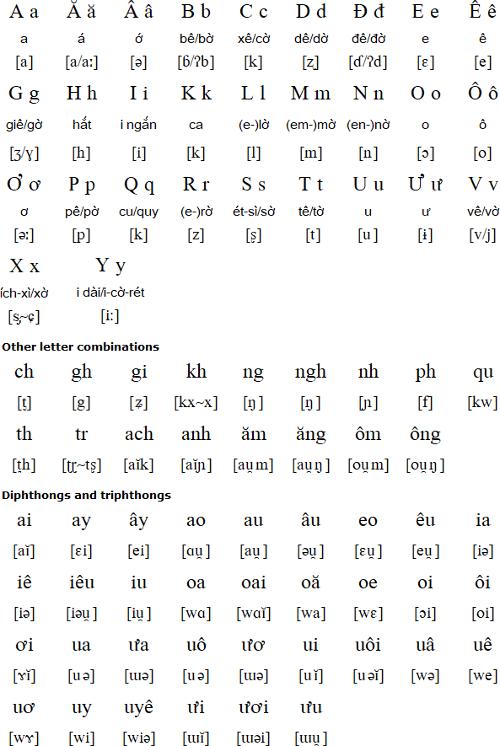VIETNAM
Language

Language

Cities in VIETNAM
| Hanoi |
Language
General
 Vietnamese keyboardPhoto: Yes0song CC 3.0 Unported no changes made
Vietnamese keyboardPhoto: Yes0song CC 3.0 Unported no changes made
Vietnam's official language is Vietnamese or "Kinh", which belongs to the Mon-Khmer branch of the Austro-Asiatic language family and is related to Hmong, Khmer, Thai and Muong. From 111 BC to 939 AD.C. when Vietnam was a province in the Chinese Empire, the Vietnamese script, "chu nho", consisted of Chinese characters. It was not until the 8th century that the so-called ch˜u'nôm script was designed, an adapted form of the Chinese character script for writing Vietnamese. In the 13th century a separately written language, the "chu nom" or "nom", emerged, more phonetically oriented. Until the early 20th century, the two spellings coexisted, after which they made way for the current ch˜u'quôc ng˜u ', which is based on the Latin alphabet and was developed in 1651 by the French Jesuit Alexandre de Rhodes. In 1919 it became the national written language. Today only scholars use the traditional calligraphic chu nom to decipher ancient inscriptions and writings.
The Chinese, especially Cantonese, backgrounds of the Vietnamese language ensure that about 80% of today's words are derived from Chinese. French loanwords (cheese = fromage = pho mat; chocolate = chocolat = so co la; mustard = moutarde = mu tat) date back to the colonial period, from the 18th to the 20th century. English loanwords were introduced by the Americans during the Vietnam War; Russian loanwords were introduced as a result of the subsequent fraternization with the former Soviet Union.
In the Mekong Delta so many people speak Khmer that the local television broadcasts programs in this language. English and French are also spoken in trade and education. Until recently, the Russian language was the most widespread foreign language in Vietnam, especially in the former communist north. After the collapse of the Soviet Union, from 1989 on, interest in the Russian language declined sharply.
The ethnic minorities are classified according to language groups. Most mountain peoples (including Tay, Tai, Hmong, Muong and Dao) in the north of Vietnam belong to the Austro-Asiatic language group. Another language group, which can also be divided into different languages and dialects, is the Tibeto-Burmese language group. The mountain peoples of the south generally speak Mon-Khmer languages.
Grammar and pronunciation
 Vietnamese alphabet and pronunciationPhoto: Quanlykhuvuc CC 4.0 International no changes made
Vietnamese alphabet and pronunciationPhoto: Quanlykhuvuc CC 4.0 International no changes made
Vietnamese has a simple grammar. Articles do not exist, nouns have no plural form and verbs are not inflected. By adding words such as "already" and "not yet", one indicates the difference between past and future tense.
However, the pronunciation of Vietnamese is very complicated. Vietnamese is a tonal language with monosyllabic words that can be pronounced in six different pitches: toneless, rising, falling rapidly, falling slowly, floating or interrupted. As a result, a word can have many different meanings. For example, depending on the accent, the word "Be" means bottle, raft, small, break, ashamed, calf, stand, carry on, arm, ocean, banana leaf, or throne.
The pitch is indicated by diacritics above or below the vocals. To make things even more complicated, some letters in north and south are pronounced differently. The 53 ethnic minorities of Vietnam each have their own dialect, which is incomprehensible to the Vietnamese.
The Vietnamese script consists of 22 letters with a whole series of slightly changed letters.
The family name always comes first, then usually two personal names come. The middle name is usually a generation name, which the parents give to both their daughters and their sons. The last name is actually the actual personal name. A Vietnamese will therefore only introduce himself to a stranger with his personal name.
Some words and expressions
- a = moth
- two = hai
- three = ba
- ten = muoi
- hundred = mot tram
- monday = thu bai
- Wednesday = thu tu
- sunday = chu nhat
- bread = banh mi
- chicken = thit go
- fish = approx
- vegetable = rau
- mineral water = nuoc suoi
- coffee = ca phe
- tea = nuoc tra
- beer = bia
- it's tasty = ngon lamb
- coffee with milk = ca phe sua
- the menu please = dua dum thuc don
- the bill please = lamb on tinh ten
- where is the bathroom? = nha ve sinh o dau?
- i want a cheaper room = toi muon phong re hon
- how long does the journey take = chuyen di se mat bao lau
- i want to see a doctor = toi can gap bac si
Sources
Krücker, F.-J. / Vietnam
Elmar
Paulzen, H. / Vietnam : mensen, politiek, economie, cultuur, milieu
Koninklijk Instituut voor de Tropen
Peterse, L. / Vietnam
Gottmer/Becht
Te gast in Vietnam
Informatie Verre Reizen
Vietnam
Cambium
Vietnam
Lannoo
Wulf, A. / Vietnam
Het Spectrum
CIA - World Factbook
BBC - Country Profiles
Last updated May 2025Copyright: Team The World of Info